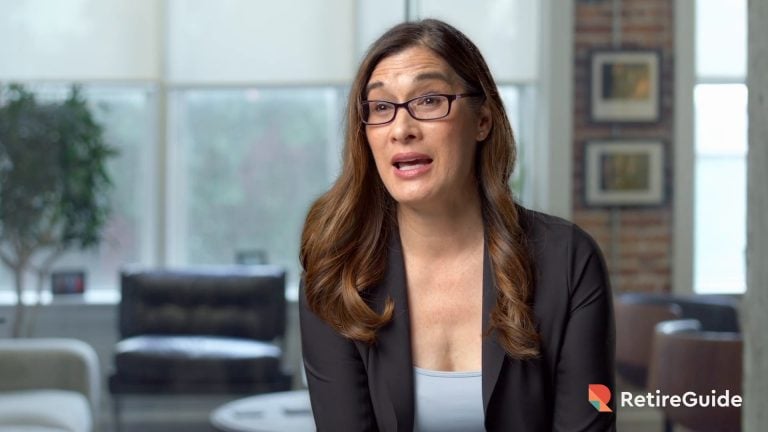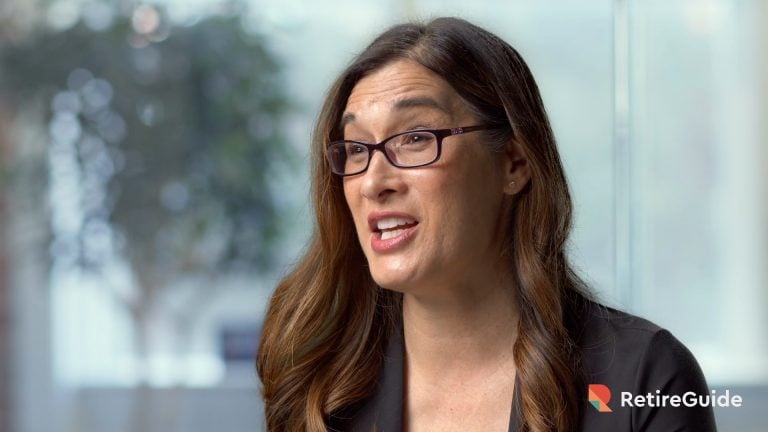Retirement Calculator
If you’re among the millions of working Americans hoping to retire comfortably, knowing whether you’re on the right path is essential and possible withRetireGuide’s retirement calculator. This tool can help you gauge your retirement savings health and get advice for getting back on the right track if your nest egg isn’t in line with your retirement goals.

- Written by Marguerita M. Cheng, CFP®, CRPC®, CSRIC®, RICP®
Marguerita M. Cheng, CFP®, CRPC®, CSRIC®, RICP®
Marguerita M. Cheng, CFP®, CRPC®, CSRIC®, RICP®, is the founder and chief executive officer at Blue Ocean Global Wealth. She is a past spokesperson for the AARP Financial Freedom campaign and has extensive expertise in the fields of financial planning, personal finance, retirement and investing.
Read More- Edited By
Savannah Pittle
Savannah Pittle
Senior Financial Editor
Savannah Pittle is a professional writer and content editor with over 16 years of professional experience across multiple industries. She has ghostwritten for entrepreneurs and industry leaders and been published in mediums such as The Huffington Post, Southern Living and Interior Appeal Magazine.
Read More- Published: August 3, 2022
- Updated: March 18, 2025
- 12 min read time
- Edited By
How much will you need to retire at ?
You will need about $ more to retire.
A key part of retirement planning is determining just how much money you’ll need to sustain your lifestyle in retirement. This is crucial for deciding whether or not you’re currently on the right track to contributing that amount — or whether you need to change your current course of action.
We developed our retirement calculator to help you create a realistic goal for how much you need to retire, understand whether you are saving enough towards that goal and evaluate your options should you need to change course to increase your retirement savings.
How To Use the Retirement Calculator
There are two primary components to the calculator: the inputs and the output.
Inputs
The primary inputs are related to your personal information. These variable fields include your current age, the age at which you plan to retire, your current income, your total available savings towards retirement and your monthly savings as a percentage of your income.
The second set of inputs include what we call assumptions — macroeconomic and demographic data that we have assumed based on the U.S. economy. They include:
- A 3% inflation rate
- A 5% rate of return on investments before retirement
- Spending during retirement will be 80% of current income
- A 25-year average length of retirement
A note on inflation here: The 3% figure is an assumption based on averages. Inflation in health care affects all of us, even the wealthiest retirees, so understanding that the figure may not accurately reflect current conditions at all times is important.
Output
Based on these two sets of inputs, the calculator will produce a benchmark amount of money you will need to retire. In other words, the amount of money you must have in your retirement savings before you can retire comfortably (and maintain your standard of living).
How Much Money Do I Need To Retire?
Financial advisors have discovered that the average retiree needs about 70% to 80% of their current annual income to live comfortably during retirement. For this calculator, we have taken the latter figure — 80% — to be conservative.
The total money you will need in retirement next depends on the number of years you will spend in retirement. For this calculator, we have assumed 25 years for a few reasons.
The Social Security Administration (SSA) found that most people who retire by 65 will live for another 19 years (men) to 21.5 years (women). This works out to an 84 to 86.5 year life expectancy on average. Meanwhile, Guardian Life reports that the average retirement age in the U.S. is 62. So, if we can assume that the average retiree lives up to 84 to 86.5 and retires at 62, they will spend between 22 and 24.5 years in retirement. Again, we have taken a conservative figure — 25 years — for this calculator.
Based on the above, you will need your retirement income (80% of your current income) for 25 years. It’s these two figures that are crucial in determining how much money you will need to retire.

Making Things Personal
While general assumptions like the ones above are essential, it’s important to emphasize that there are many people whose situations deviate from the norm. And you might be one of them.
Consider a hypothetical scenario in which Mr. James has designed a plan for how he intends to enjoy retirement, including extensive traveling that might make it necessary for him to go beyond 80% of his current income. Mrs. Smith’s plan might have the same retirement goal, but is so prudent (relatively speaking) with saving that she only needs 60% of her current income to make it a reality.
A second factor is life expectancy. Though the official life expectancy figure is declining, many people are still living well beyond that figure.
Consequently, many Americans will spend over 25 years in retirement. What, then, happens when it turns out they need more than they budgeted? We know this as the longevity risk and it’s factored in to account for our choosing 25 years instead of 22 as the number of years in retirement. If you are very healthy and your family has a history of living longer than official life expectancy figures, then you might safely assume you can increase the number of years you expect to spend in retirement.
A retirement calculator does not take away the need to speak to your financial advisor about your unique condition. But you can still use it as a credible and dependable guide while understanding that your situation — retirement income needs and life expectancy, for example — may not perfectly fit its parameters.
When Should I Retire?
In a bid to reduce the number of years they will spend in retirement (among other reasons) and, by implication, the amount of savings they will need in retirement, many Americans are choosing to retire late.
Another advantage of retiring later is the opportunity to max out Social Security benefits. While those who qualify can begin to take social security benefits by 62, waiting until the full retirement age of between 65 and 67 will increase the amount of benefits significantly. Waiting until after the full retirement age will further increase the benefits.
Many people plan to retire at their full retirement age. Guardian Life reported that more Americans are working longer, mainly due to a longer life expectancy and the need for a larger nest egg. And, as noted above, Guardian Life reported that the median age of retirement is 62 in 2024.
So, what age should you retire?
Again, like the question about the amount of retirement savings you need, this depends on your unique set of circumstances. The first factor is health. Do you think you are healthy enough to carry on until you are 65 or 67 or 70? Or is your health better served by retiring at 60 or 62?
Your financial standing is another consideration. If you are on the right track towards saving enough to retire at 62 (without factoring in Social Security), there might not be any financial necessity to delay retirement. However, if you need to max out Social Security benefits to achieve your goals, you might need to wait till full retirement age — or beyond — provided your health is good.
Career drive is also a factor. Many people delay retirement because of their passion for their work and the feeling that they won’t have anything to do that can match the fulfilment at work. This might be you, but you also need to factor in your health.
In contrast to the above, there are those in the Financial Independence, Retire Early (FIRE) movement who believe in retiring as early as possible and saving aggressively to achieve that goal. For these people, early retirement frees them to do whatever they find fulfilling without a consideration for money. Some of them might work in charity, as missionaries, or travel around the world for adventure.
The key point is to evaluate your own situation — your health, financial situation and life ambitions — and choose your retirement age accordingly.

Social Security and Pension Considerations
After using the retirement calculator to gauge how much you’ll need to retire based on the two sets of inputs, the next step is to determine if your current retirement plan is well-designed to provide what you need.
There are three broad ways to get money in retirement: retirement savings, Social Security checks and pension payments.
Retirement savings here refer to all defined contribution plans, including employer-sponsored plans like 401(k) and traditional or Roth individual retirement accounts (IRAs).
Social Security is the U.S. government’s welfare system for retirees.
A pension, for our purposes, refers to benefits derived from a defined benefit plan.
Pensions and Retirement Planning
Though defined benefit plans are now widely going extinct, it’s possible that your company offers one. If they do so, you need to find out how much you will receive as a pension (annually) during retirement.
This affects your retirement planning because pensions reduce the amount you’ll need to lean on from retirement savings and Social Security benefits. For example, if you need $80,000 annual income during retirement and you are expecting a pension payment of $20,000, it means you only need to get $60,000 from both retirement savings and Social Security benefits.
Social Security and Retirement Planning
At its onset, Social Security was designed to replace an average of 40% of the employment income of retirees. However, the amount it replaces in actuality varies based on whether the beneficiary is a lower-earning or higher-earning worker.
The SSA also has a benefits calculator which you can use to estimate your Social Security benefits in today’s dollars or future dollars. With the future dollars option, you can estimate how much you will receive during retirement. The result is a monthly figure which you can multiply by 12 to get a yearly figure.
Like pensions, you can deduct this amount from your retirement income to determine how much you will need from retirement savings.
For example, suppose you are expecting $12,000 ($1,000 x 12) in annual Social Security benefits at retirement. In addition to the $20,000 from the pension above, then you’ll need to get the remaining $48,000 of your target from retirement savings.
Factoring in any pensions and Social Security benefits will reduce the amount you’ll need to contribute through retirement savings.
Retirement Savings
As mentioned, pensions are going extinct. Therefore, the only assured income for many retirees is their Social Security benefits.
Many conservative individuals do not even factor in Social Security benefits when determining how much they should save towards retirement. Instead, they prefer to see it as extra income that they can spend as they like. This means they prefer to save more outright to ensure a financial safety net.
Others opt to factor in Social Security benefits and therefore reduce their target retirement savings goal.
There is no right or wrong way to work these numbers. It all depends on whether you want that extra safety net and if you can save enough to contribute the amount you need at retirement without considering Social Security benefits.
What Can I Do To Boost My Retirement Savings?
From the calculator, you will discover if your current retirement savings trajectory will be enough to get you what you need at retirement.
This will help illustrate much you will need at retirement based on the assumption that you will spend 80% of your current income for 25 years (let’s call this “amount needed at retirement”). You will also see the amount you need from retirement savings after factoring in pensions and/or Social Security benefits (let’s call this “amount needed from retirement savings”).
You will then see how much you will have at retirement based on the total savings you have already, your current income, the percentage of your income you are saving, the 3% inflation rate and the 5% rate of return (let’s call this “expected retirement savings”).
If the expected retirement savings is equal to or greater than the amount needed from retirement savings, then you are safe and can consider yourself on the right track.
If it’s less, then you need to explore ways to boost your retirement savings. Luckily, you have options no matter how off track from the target you may currently be. Below are some options to consider.
- Take Full Advantage of Your 401(k)
- If your employer offers a 401(k) and you are not yet enrolled, it’s advisable to get on board.
- If you are already enrolled and your employer offers to match your contributions up to a certain percentage of your income, consider maxing out that benefit. For example, if your employer offers to match your contributions up to 4% of your income, ensure you are contributing at least 4% of your income to max out that matching contributions.
- Consider increasing your contributions further if you have not reached the contribution limits. Contribution limits increase by $6,500 for those 50 or older, so try to take advantage of these catch-up contributions if you are eligible.
- Take Full Advantage of Your IRA
- In addition to a 401(k) or any other employer-sponsored plan, you can open a Roth IRA or a traditional IRA. With an IRA, you can contribute a maximum of an extra $6,000 ($7,000 for individuals over 50) depending on your modified adjusted gross income.
- Use Extra Funds Wisely
- If your expected retirement savings is less than the amount you need, be acutely aware of the way you use extra income outside of your regular budget. Suppose you receive a cash gift or a bonus commission from work. It’s prudent to consider putting some of these towards retirement.
- If you have already exhausted the contribution limits on both your employer-sponsored plans and IRA, you can save extra funds in a non-qualified investment account. While they may not offer any tax benefits, these accounts can be important additional sources of funds in retirement.
- Reevaluate Your Budget
- The first two points on this list might require that you cut down on some expenses. If you work at it, you will discover opportunities to reduce or eliminate some of your current expenses without compromising your overall living standard.
- Delay Retirement
- This is an option, but consider everything we discussed above about delaying retirement age before deciding whether it’s right for you.
Any retirement calculator has limitations. The results of our calculator need are best used by you and your financial advisor as inputs in your retirement planning. So, use the calculator for a baseline and consult with your financial advisor who can help you make the wisest choices given your financial goals and current situation.
Writer Anna Baluch contributed to this article.
Calling this number connects you to one of our trusted partners.
If you're interested in help navigating your options, a representative will provide you with a free, no-obligation consultation.
Our partners are committed to excellent customer service. They can match you with a qualified professional for your unique objectives.
We/Our Partners do not offer every plan available in your area. Any information provided is limited to those plans offered in your area. Please contact Medicare.gov or 1-800-MEDICARE to get information on all of your options.
844-897-8632Your web browser is no longer supported by Microsoft. Update your browser for more security, speed and compatibility.
If you need help pricing and building your medicare plan, call us at 844-572-0696

